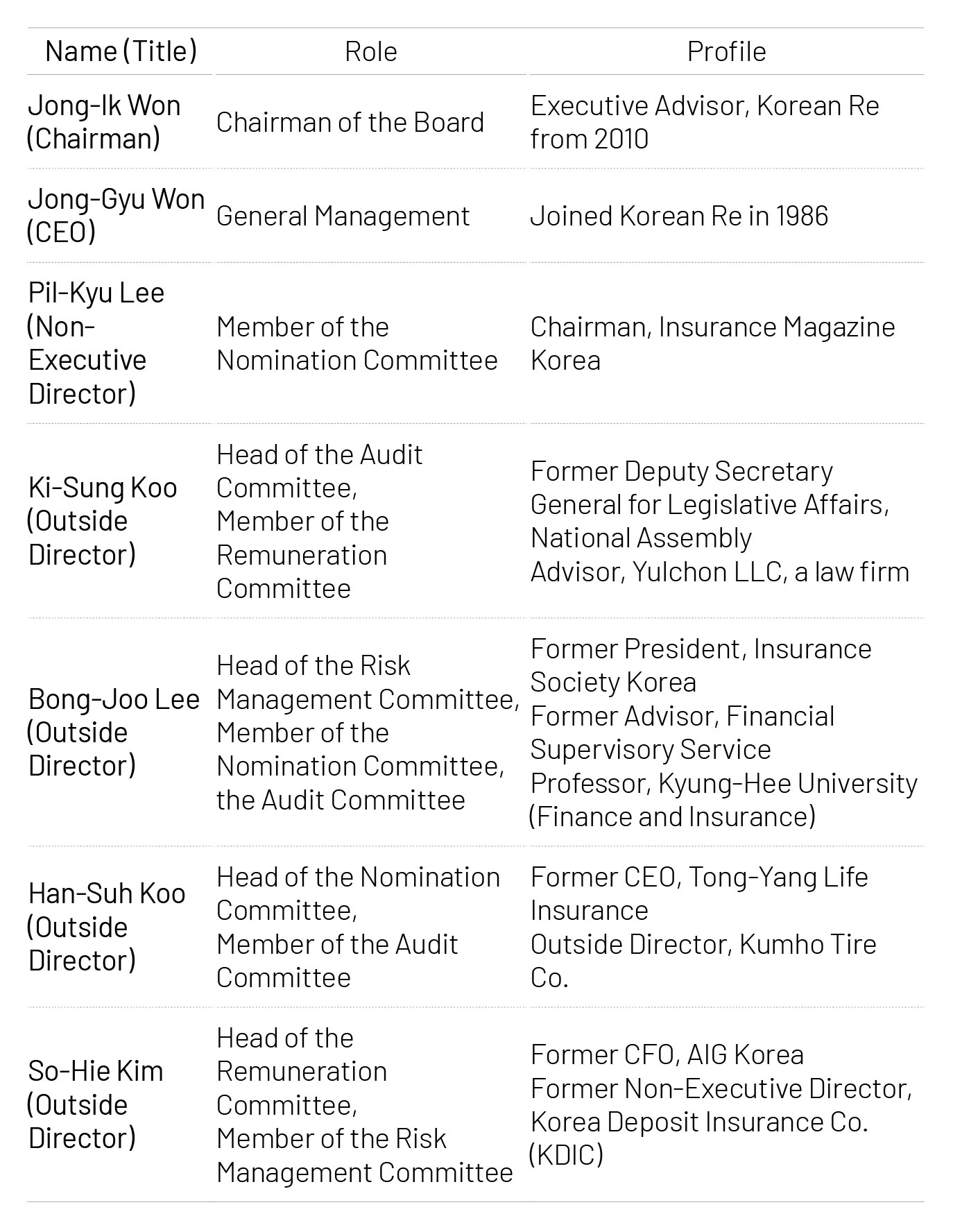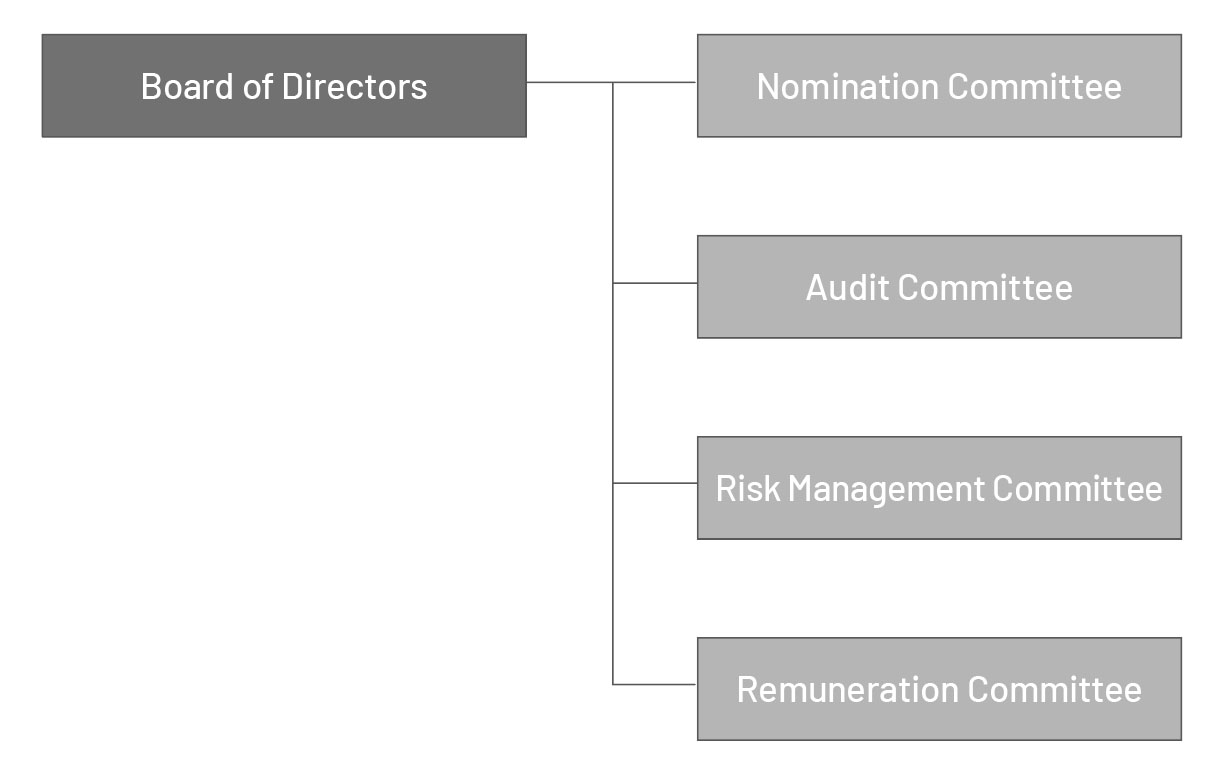Korean Re is committed to promoting sound corporate governance practices so as to create enduring value for our business, clients, employees, and all other stakeholders. Governance fundamentally involves how Korean Re makes decisions and provides oversight of business management.
Our governance framework is designed to facilitate the effective management of the company. The Board of Directors (BOD) is responsible for setting corporate objectives and policies as well as overseeing executives and their management activities. The BOD is composed of directors who are elected by the shareholders at the general shareholder’s meeting, and is operated in accordance with related laws and the articles of incorporation.
Since the general shareholders’ meeting on March 26, 2021, our BOD has consisted of seven directors (three inside directors, i.e. the Chairman, the CEO, and a non-executive director, and four outside directors). In order to complement each director’s expertise and experience in the process of deliberation and resolution within the BOD, we have outside directors with diverse expertise in various fields.
Our governance framework is designed to facilitate the effective management of the company. The Board of Directors (BOD) is responsible for setting corporate objectives and policies as well as overseeing executives and their management activities. The BOD is composed of directors who are elected by the shareholders at the general shareholder’s meeting, and is operated in accordance with related laws and the articles of incorporation.
Since the general shareholders’ meeting on March 26, 2021, our BOD has consisted of seven directors (three inside directors, i.e. the Chairman, the CEO, and a non-executive director, and four outside directors). In order to complement each director’s expertise and experience in the process of deliberation and resolution within the BOD, we have outside directors with diverse expertise in various fields.
Roles and Brief Profiles of BOD Members
| Name (Title) | Role | Profile |
|---|---|---|
| Jong-Ik Won (Chairman) | Chairman of the Board | Executive Advisor, Korean Re from 2010 |
| Jong-Gyu Won (CEO) | General Management | Joined Korean Re in 1986 |
| Pil-Kyu Lee (Non-Executive Director) |
Member of the Nomination Committee | Chairman, Insurance Magazine Korea |
| Ki-Sung Koo (Outside Director) |
Head of the Audit Committee, Member of the Remuneration Committee |
Former Deputy Secretary General for Legislative Affairs, National Assembly Advisor, Yulchon LLC, a law firm |
| Bong-Joo Lee (Outside Director) |
Head of the Risk Management Committee, Member of the Nomination Committee, the Audit Committee |
Former President, Insurance Society Korea Former Advisor, Financial Supervisory Service Professor, Kyung-Hee University (Finance and Insurance) |
| Han-Suh Koo (Outside Director) |
Head of the Nomination Committee, Member of the Audit Committee |
Former CEO, Tong-Yang Life Insurance Outside Director, Kumho Tire Co. |
| So-Hie Kim (Outside Director) |
Head of the Remuneration Committee, Member of the Risk Management Committee |
Former CFO, AIG Korea Former Non-Executive Director, Korea Deposit Insurance Co. (KDIC) |
In addition, the authority to appoint and dismiss the CEO and the Chairman of the Board is granted to the BOD. A lead independent director representing all outside directors is also appointed to ensure that the BOD serves as a check against management when the Chairman of the BOD is not appointed among the outside directors.
Korean Re has four committees in the BOD, i.e. the Nomination Committee, the Audit Committee, the Risk Management Committee, and the Remuneration Committee to enhance the efficiency and expertise of its decision-making.
The Nomination Committee recommends candidates for the CEO, outside directors, and Audit Committee members, and performs tasks related to management and verification of candidate groups.
The Audit Committee aims to improve the adequacy of the company’s overall internal control system and evaluation of management performance in accordance with related laws and internal regulations. The committee’s duties and authority are independent from the BOD and management.
The Risk Management Committee was established in accordance with relevant laws and regulations to efficiently supervise and oversee the company’s overall risk management framework and to build and maintain an advanced risk management system.
The Remuneration Committee is responsible for structuring, operating, and determining payrolls under the performance-based compensation system for management. It deliberates and decides on matters delegated by the BOD with regard to the remuneration system for executives (excluding outside directors, the non-executive director, audit committee members, CCO, and CRO).
In addition, the authority to appoint and dismiss the CEO and the Chairman of the Board is granted to the BOD. A lead independent director representing all outside directors is also appointed to ensure that the BOD serves as a check against management when the Chairman of the BOD is not appointed among the outside directors.
Korean Re has four committees in the BOD, i.e. the Nomination Committee, the Audit Committee, the Risk Management Committee, and the Remuneration Committee to enhance the efficiency and expertise of its decision-making.
The Nomination Committee recommends candidates for the CEO, outside directors, and Audit Committee members, and performs tasks related to management and verification of candidate groups.
The Audit Committee aims to improve the adequacy of the company’s overall internal control system and evaluation of management performance in accordance with related laws and internal regulations. The committee’s duties and authority are independent from the BOD and management.
The Risk Management Committee was established in accordance with relevant laws and regulations to efficiently supervise and oversee the company’s overall risk management framework and to build and maintain an advanced risk management system.
The Remuneration Committee is responsible for structuring, operating, and determining payrolls under the performance-based compensation system for management. It deliberates and decides on matters delegated by the BOD with regard to the remuneration system for executives (excluding outside directors, the non-executive director, audit committee members, CCO, and CRO).
Governance Framework




